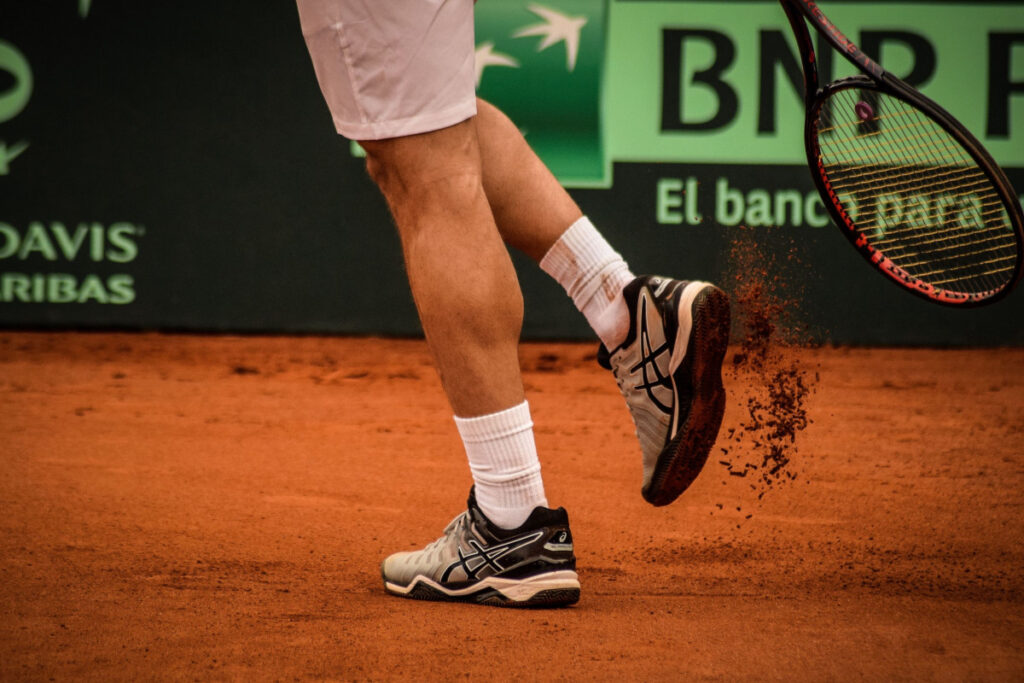Simplify – The Best Adjustment You Could Ever Make
posted on: March 26, 2020
author: Brian Lomax, Ed.D.
 One of the realities of sport, especially a sport like tennis, is that sometimes we don’t play well. Sometimes things don’t go our way. It could even be that the opponent is playing out of his or her mind – that’s annoying. In these moments, our natural tendency is to be judgmental and overanalyze the situation. We start to think about why we aren’t playing well. Our self-talk may even be irrational and critical (“why did you hit that shot?”, “you’re so bad!”). We begin to consider technical changes, tactical adjustments, or perhaps a complete change in strategy. And sometimes this type of thinking works, but it usually doesn’t. What should we do instead? Simplify, simplify. Calm down and simplify.
One of the realities of sport, especially a sport like tennis, is that sometimes we don’t play well. Sometimes things don’t go our way. It could even be that the opponent is playing out of his or her mind – that’s annoying. In these moments, our natural tendency is to be judgmental and overanalyze the situation. We start to think about why we aren’t playing well. Our self-talk may even be irrational and critical (“why did you hit that shot?”, “you’re so bad!”). We begin to consider technical changes, tactical adjustments, or perhaps a complete change in strategy. And sometimes this type of thinking works, but it usually doesn’t. What should we do instead? Simplify, simplify. Calm down and simplify.
“Our life is frittered away by detail… simplify, simplify.”
-Henry David Thoreau (1817-1862)
Note: In this post, I am going to address this from the perspective of a tennis player, although I think it applies to other sports, as well as business performance.
Focus on the little things
Great performances always start with the little things. If you can do the little things well – really well – you establish an excellent foundation for your performance. The problem is that most of us don’t pay attention to the little things. We are either unaware of them or we take them for granted. Let’s go back to basics. Let’s simplify.
Focus on your breathing
It doesn’t get more basic than breathing. Focusing on your breathing calms the mind and relaxes the body. If you’re not playing well, it is likely that anxiety and muscle tension are corrupting your technique and your ability to trust yourself. Taking some rhythmic diaphragmatic breaths quiets the mind and allows your body to rediscover the rhythm, tempo, and balance required to play well. Just breathe! Let the breath do its magic.
Focus on your body language
When I refer to having great body language on the tennis court, I call it positive presence. If you focus on bringing a more positive, confident, and powerful presence to the court, you will begin to restore your confidence and self-belief. It can also aid your energy and intensity, which will in turn have a positive effect on your focus from point to point. Bring a positive presence to everything you do.
Increase your effort level
Stepping up your effort level will bring more intensity and focus to your performance. Move your feet more. Bounce up and down. Chase down every ball. Don’t ever give up.
Going to the next level with your effort might be exactly what you need to get back on track. It’s also controllable and simple.
Take more time in between points
Taking more time between points allows you to take control of the pace of the match. It gives you more time to let your breathing and body language have their desired effects on your game. By slowing down the match, you may also be able to slow your opponent’s momentum. When you’re losing, you have to be do everything you can to keep your opponent on the court as long as possible. More time between points is a part of that strategy.
Simplify your self-talk
 As stated earlier, our typical self-talk is often judgmental and irrational when we’re struggling. That’s counterproductive. Instead, you have to keep your internal dialogue simple and productive. Two categories of self-talk to use are motivational self-talk and instructional self-talk. Motivational self-talk can help you increase intensity, effort, confidence, and motivation. Examples are “let’s go,” “you got this,” “this is your match,” etc. Instructional self-talk consists of simple statements telling you what to do. For instance, “move your feet,” “next point,” “hit high and heavy,” etc.
As stated earlier, our typical self-talk is often judgmental and irrational when we’re struggling. That’s counterproductive. Instead, you have to keep your internal dialogue simple and productive. Two categories of self-talk to use are motivational self-talk and instructional self-talk. Motivational self-talk can help you increase intensity, effort, confidence, and motivation. Examples are “let’s go,” “you got this,” “this is your match,” etc. Instructional self-talk consists of simple statements telling you what to do. For instance, “move your feet,” “next point,” “hit high and heavy,” etc.
When you’re not playing well, you don’t need the detailed analysis. You know what’s going on and you know what to do. Simplified self-talk provides you with the reminders that you need in order to do these basic tasks.
Simplify your game plan
Having a simple game plan is always a good thing. But if you start overanalyzing the situation, you are more likely to deviate from this principle. Instead, focus on playing simple patterns and/or hitting to big targets. Look to extend points. When you’re losing, points are probably going way too fast, so you have to change that dynamic. Play longer points.
Again, when you are down in a match, you have to keep the opponent on the court as long as possible to give yourself a chance to turn the match around. Simplifying your game plan can not only help you do this, but it can also assist in restoring confidence in your strokes.
Conclusion
During stressful matches, resist the urge to overanalyze and overcomplicate the situation. Instead, follow the advice of Henry David Thoreau – simplify, simplify. Do the simple things, and do them well. It’s the simple things that are the foundation for great performance.
About the Author
Dr. Brian Lomax founded PerformanceXtra™ in 2009 with a mission of helping athletes achieve their goals and their top performances more consistently through a progression of mental skills that enables them to focus on what is truly important.
Learn more about the author: https://performancextra.com/brian-lomax/



